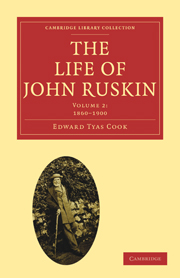Book contents
- Frontmatter
- Contents
- CHAPTER I UNTO THIS LAST (1860)
- CHAPTER II EXILE (1861–1863)
- CHAPTER III BOULOGNE—LUCERNE—MILAN (1861–1862)
- CHAPTER IV MORNEX—MUNERA PULVERIS (1862–1863)
- CHAPTER V HOME LIFE AT DENMARK HILL (1864–1866)
- CHAPTER VI SESAME AND LILIES—THE GROWN OF WILD OLIVE—THE ETHICS OF THE DUST (1865, 1866)
- CHAPTER VII TIME AND TIDE (1866, 1867)
- CHAPTER VIII RUSKIN's POLITICAL ECONOMY
- CHAPTER IX ABBEVILLE AND VERONA (1868, 1869)
- CHAPTER X OXFORD PROFESSOR (1870–1878)
- CHAPTER XI FIRST OXFORD LECTURES (1870, 1871)
- CHAPTER XII A DARK YEAE (1871)
- CHAPTER XIII BOTTICELLI (1872, 1873)
- CHAPTER XIV WITH ST. FRANCIS AT ASSISI (1874)
- CHAPTER XV THE END OF A ROMANCE (1875)
- CHAPTER XVI HOME LIFE AT BRANTWOOD (1872–1876)
- CHAPTER XVII VENICE REVISITED (1876–1877)
- CHAPTER XVIII FORS CLAVIGERA (1871–1878)
- CHAPTER XIX THE ST. GEORGE'S GUILD
- CHAPTER XX THE RUSKIN MUSEUM
- CHAPTER XXI SCHOOLS OF ST. GEORGE
- CHAPTER XXII ARROWS OF THE CHACE
- CHAPTER XXIII “THE DREAM” (1877–1878)
- CHAPTER XXIV STUDIES OF FLOWERS AND ROCKS (1878)
- CHAPTER XXV RETURN TO WORK (1878–1880)
- CHAPTER XXVI THE BIBLE OF AMIENS. FURTHER ILLNESSES (1880–1882)
- CHAPTER XXVII SECOND PROFESSORSHIP AT OXFORD (1882–1885)
- CHAPTER XXVIII PRÆTERITA (1885–1889)
- CHAPTER XXIX OLD AGE AND LAST WORKS (1886–1889)
- CHAPTER XXX CLOSING YEARS (1889–1900)
- CHAPTER XXXI CHARACTERISTICS
- CHAPTER XXXII INFLUENCE
- INDEX
CHAPTER VI - SESAME AND LILIES—THE GROWN OF WILD OLIVE—THE ETHICS OF THE DUST (1865, 1866)
Published online by Cambridge University Press: 07 September 2011
- Frontmatter
- Contents
- CHAPTER I UNTO THIS LAST (1860)
- CHAPTER II EXILE (1861–1863)
- CHAPTER III BOULOGNE—LUCERNE—MILAN (1861–1862)
- CHAPTER IV MORNEX—MUNERA PULVERIS (1862–1863)
- CHAPTER V HOME LIFE AT DENMARK HILL (1864–1866)
- CHAPTER VI SESAME AND LILIES—THE GROWN OF WILD OLIVE—THE ETHICS OF THE DUST (1865, 1866)
- CHAPTER VII TIME AND TIDE (1866, 1867)
- CHAPTER VIII RUSKIN's POLITICAL ECONOMY
- CHAPTER IX ABBEVILLE AND VERONA (1868, 1869)
- CHAPTER X OXFORD PROFESSOR (1870–1878)
- CHAPTER XI FIRST OXFORD LECTURES (1870, 1871)
- CHAPTER XII A DARK YEAE (1871)
- CHAPTER XIII BOTTICELLI (1872, 1873)
- CHAPTER XIV WITH ST. FRANCIS AT ASSISI (1874)
- CHAPTER XV THE END OF A ROMANCE (1875)
- CHAPTER XVI HOME LIFE AT BRANTWOOD (1872–1876)
- CHAPTER XVII VENICE REVISITED (1876–1877)
- CHAPTER XVIII FORS CLAVIGERA (1871–1878)
- CHAPTER XIX THE ST. GEORGE'S GUILD
- CHAPTER XX THE RUSKIN MUSEUM
- CHAPTER XXI SCHOOLS OF ST. GEORGE
- CHAPTER XXII ARROWS OF THE CHACE
- CHAPTER XXIII “THE DREAM” (1877–1878)
- CHAPTER XXIV STUDIES OF FLOWERS AND ROCKS (1878)
- CHAPTER XXV RETURN TO WORK (1878–1880)
- CHAPTER XXVI THE BIBLE OF AMIENS. FURTHER ILLNESSES (1880–1882)
- CHAPTER XXVII SECOND PROFESSORSHIP AT OXFORD (1882–1885)
- CHAPTER XXVIII PRÆTERITA (1885–1889)
- CHAPTER XXIX OLD AGE AND LAST WORKS (1886–1889)
- CHAPTER XXX CLOSING YEARS (1889–1900)
- CHAPTER XXXI CHARACTERISTICS
- CHAPTER XXXII INFLUENCE
- INDEX
Summary
“ I have seceded from the study not only of architecture, but nearly of all art; and have given myself, as I would in a besieged city, to seek the best modes of getting bread and water for its multitudes, there remaining no question, it seems to me, of other than such grave business for the time.
”—The Study of Architecture (1865).The phase of Ruskin's literary activity which followed the death of his father took the form of lectures and letters. The impulse towards the platform returned strongly upon him after a period of seclusion; he wanted once more to have his audience face to face, and to rouse them, if he might, to a sense of the evils which was burning within him. The manifold lectures, speeches, articles, and books, which he now poured forth, tell of abounding activity and untiring industry; but the work is very discursive. He talks and writes of books and how to read them; of the sphere and education of women; of soldiers and their duties; architects and their functions; servants and their loyalties; masters and their duties. He discusses now the elements of crystalisation or porches of Abbeville; and now the rights and wrongs of the Jamaica insurrection or the policy of nonintervention in European quarrels. He passes from the designs upon Greek coins to the management of railways and the prospects of co-operative industry.
The wide range over which he travelled at this time was due not only to an intellectual and artistic curiosity, as boundless as it was desultory; it was caused also by the conflict which had now become chronic between two sides of his nature.
- Type
- Chapter
- Information
- The Life of John Ruskin , pp. 87 - 107Publisher: Cambridge University PressPrint publication year: 2010First published in: 1911



